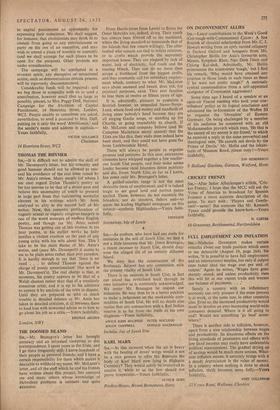SIR,—Nicholas Davenport makes certain remarks about our trade position which
seem to me debatable (August 19, page 264). He writes, 'It is possible to have full employment and an international surplus, but only if output rises faster than the wage cost per unit of output.' Again he writes, 'Wages have gone sharply ahead, and unless productivity rises this will hit at our export trade and worsen our balance of payments. . .
Surely a country with an inflationary economy can only prosper if the same process is at work, at the same rate, in other countries also. Even so, the increased productivity would seem. to involve an ever-increasing world-wide consumer demand. Where is it all going to end? Would not something `go bust' some- where?
There is another side to inflation, however, apart from a nice relationship between wages and productivity. Its disastrous effects on the living standards of pensioners and others with low fixed incomes may easily have undesirable political repercussions. The gradual drying,up of savings would be much more serious. What- ever inflation means, it certainly brings with it a steady depreciation in the value of money. In a country where nothing is done to check inflation, thrift becomes mere folly.—Yours faithfully,
JOHN COLLINSON
32 VViler Road, Wallasey, Cheshire


































 Previous page
Previous page